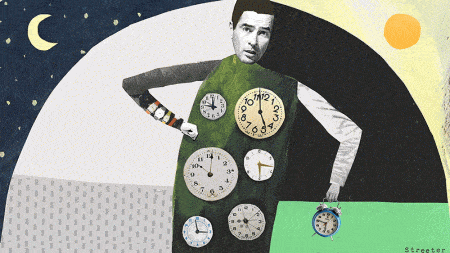If you’re feeling a little sluggish or more tired since the time change, or if you’re not as happy-go-lucky as you usually are, don’t worry. It’s not your imagination. And you’re not alone.
Research has consistently shown us that something (that seems) as inconsequential as a time change can produce some startling negative health effects.
-
-
- A 2012 study in Denmark that involved 185,000 people found that the incidence of depression rose by 11% immediately following a time change.
-
- The American Heart Association, during a recent conference, revealed a study that showed an increase in the number of patients admitted to a hospital for atrial fibrillation following a time change.
-
- An Australian study in 2008 found that there was an increase in the number of suicides in men following the start of a new time change.
-
- A Swedish study, also in 2008, discovered an increase (by as much as 5%) in heart attacks within the three days after a time change. And they attributed this increase to the change in sleep patterns and the disruption of our chronobiological rhythms.
-
Why is this happening. And what can we do about it?
From a chiropractic standpoint, a time change is adding stress to a body that is ill-equipped to handle any additional stress. As Americans, our bodies are already overstressed. Whether physically, chemically, or emotionally, one thing is clear – our nervous systems cannot handle anymore stress.
A time change may not seem like a major change. However, it requires each of us to get used to waking at a different time, going to bed at a different time, and working at a different time. Not to mention the disruption in our eating patterns.
The truth is that if your nervous system wasn’t already bogged down with stress, a time change wouldn’t be a major concern. But eventually there’s a tipping point. Eventually too much becomes, well, too much. And that’s when you end up in the emergency room. That’s when your symptoms of depression strengthen. That’s when a heart attack goes from possible to probable.
So, what can you do about it?
You have to be aware of the stress placed on your body. And you need to regularly reduce that stress, especially during fall and spring when the time changes.
From a chemical standpoint, that means eating better, as many toxins we put into our bodies come directly from the foods we eat. So, eat less processed and fast foods. Consume less sugar and caffeine. And get more fruits, vegetables, nuts, seeds, and healthy fats into your diet.
From a physical standpoint, much of the stress we place on our bodies usually comes from a lack of high-quality sleep. So, make sure you’re getting enough good sleep, particularly as a time change grows nearer. Try going to bed an hour earlier or sleeping in a little later. In addition, working in front of a computer all day and staring down at our phones as much as we do causes enormous physical stress. Be sure your workstation is ergonomically correct and take frequent stretch breaks. When looking at your phone, hold it in a position so that you’re not looking down at it, it should be held at eye level so you back and neck are not being strained.
When it comes to reducing emotional stress, give meditation a try. (If your mind is especially loud and active, try guided meditation.) Give deep breathing exercises a try, as it’s nearly impossible to breathe deeply and be stressed-out. Keep a journal, spend quality time with good friends and family, or find another healthy outlet to relax and rejuvenate.
Lastly, and perhaps most importantly, research has shown that regular chiropractic adjustments are excellent for reducing nervous system stress. If you’re not already getting regular adjustments, you’ll benefit by getting a couple around the time changes and you will begin to really transform your health by choosing to start regular chiropractic care. And if you are getting regular adjustments, try adding a couple extra ones just before and after the time shifts.
The key to surviving a time change with no ill effects requires a reduction in nervous system stress. (Actually, a lot depends on the health of your nervous system.) When your nervous system is overstressed, you can’t adapt as easily to time changes. Or any number of added stressors you likely experience day-in and day-out.
Find a TRUCHIRO at TRUCHIRO.org, a chiropractor who understands the incredible role the central nervous system plays in your health. Decreasing nervous system stress is your ticket to feeling better and healthier in so many ways.



